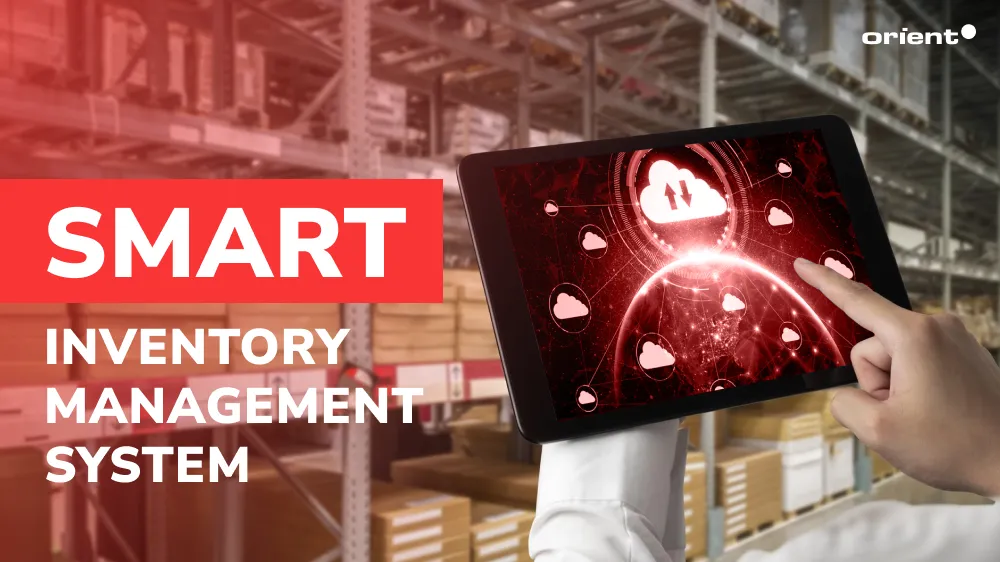
Can a Smart Inventory System Really Improve My Bottom Line?

Content Map
More chaptersEver stare at a mountain of unsold products, knowing you’re losing money on storage and missed sales opportunities? Or maybe you’ve experienced the dreaded stockout, leaving frustrated customers empty-handed. But what if there was a way to automate the chaos, predict demand with laser focus, and free up valuable resources?
Luckily, smart inventory management software is here to streamline the supply chain magic behind the scenes. Advanced analytics and automated replenishment now power precision tracking across limitless stock-keeping units (SKUs) and warehouses. Real-time visibility across your network means perfect order fulfillment, lean storage, and cost savings up the wazoo.
A smart inventory management system is considered a state-of-the-art solution that uses advanced technologies like IoT, robots, RFID tracking, and smart shelves to collect and analyze real-time data. This system offers 360-degree warehouse visibility, streamlines inventory handling throughout the distribution cycle, and minimizes the need for human intervention.
So, can a smart inventory system really improve your bottom line? In the following, we’ll delve deeper into the world of smart inventory systems, explore their benefits, and provide concrete proof of their impact on business profitability.
Understanding Inventory Management Challenges
Inventory management is essential for any company that deals with tangible products. However, traditional methods of managing inventory often come with a host of challenges.
- Inaccurate Data: One of the most common issues businesses face when trying to manage inventory is the lack of real-time visibility into their stock. Manual processes and outdated systems are breeding grounds for errors. Inconsistent tracking across spreadsheets or paper-based systems can lead to discrepancies in stock levels. Without an accurate, up-to-date view of their inventory levels, businesses can find themselves either running out of products or sitting on excess stock, both of which can have serious financial implications.
- Demand Fluctuations: Customer demand is rarely static. Seasonal trends, unexpected surges, and shifting market preferences can throw off your inventory data calculations. Without the ability to predict these fluctuations, you risk overstocking on slow-moving items or experiencing stockouts of popular products.
- Limited Visibility: Do you truly know what’s happening to your inventory across your entire supply chain? Traditional methods often lack the ability to track products in real-time, from the moment they leave the manufacturer to the time they reach your warehouse shelves. This limited visibility makes it difficult to identify bottlenecks and inefficiencies.
- Overstocking and Understocking: This is a delicate balancing act. Holding too much inventory ties up capital, eats away at storage space, and increases the risk of obsolescence. On the other hand, understocking leads to frustrated consumers, lost sales, and potential damage to your reputation.
- Warehouse Inefficiency: Poorly organized warehouses with inefficient picking and packing processes can lead to delays, wasted time, and increased labor costs. Manual processes like paper-based order fulfillment can further slow things down, impacting your ability to meet customer delivery expectations.
Given these challenges, it’s clear that a smarter approach to inventory management is needed. A system that can provide real-time visibility into stock levels, automate manual tasks, and use data to predict future demand can significantly improve a business’s inventory management processes.
What Is a Smart Inventory Management System?
A Smart Inventory Management System is a technologically advanced system designed to streamline inventory processes in businesses. It uses modern technologies such as artificial intelligence (AI), machine learning (ML), and the Internet of Things (IoT) to automate and optimize inventory management. These systems are designed to provide real-time inventory visibility, accurate forecasting, and efficient warehouse management, thereby reducing the risk of stockouts or overstocking.
Smart inventory management systems are characterized by several key features and components. One of the primary features is real-time inventory visibility. This enables organizations to track their inventory levels in real time, providing them with up-to-date information about their stock levels, sales, and orders. This feature is crucial for avoiding stockouts and overstocking, which can both have detrimental effects on a business’s bottom line.
Another key component of smart inventory management solutions is inventory optimization. This involves using machine learning techniques and advanced algorithms to predict future demand patterns and adjust inventory levels accordingly. This helps businesses maintain optimal stock levels, reducing the risk of stockouts and overstocking.
Smart inventory management systems leverage technology and automation in several ways. They use AI and ML algorithms to analyze historical sales data and predict future demand patterns. This allows businesses to adjust their inventory levels proactively, reducing the risk of stockouts and overstocking.
Furthermore, these systems use IoT technology to provide real-time inventory visibility. This involves using sensors and RFID tags to track inventory levels in real time, offering businesses with up-to-date information about their stock levels, sales, and orders.
Benefits of a Smart Inventory System

The advantages of implementing a smart inventory system extend far beyond simply automating tasks. These intelligent systems offer a comprehensive solution that can significantly enhance your business operations and profitability. Let’s delve into some of the key benefits:
Enhanced Demand Forecasting and Supply Chain Efficiency: One of the primary benefits of a smart inventory system is the enhancement in demand forecasting and supply chain efficiency. By leveraging advanced algorithms and real-time data, these systems can accurately predict future demand patterns. This allows businesses to plan their inventory needs more effectively, reducing the potential risk of overstocking or stockouts. Furthermore, with inventory tracking, businesses can monitor their stock levels in real-time, enabling them to react quickly to changes in user demand and supply chain disruptions. This results in a supply chain that is more robust and efficient.
Improved Order Fulfillment and Customer Satisfaction: A smart inventory system plays a crucial role in improving order fulfillment and, consequently, customer satisfaction. With real-time inventory tracking, businesses can ensure they have sufficient stock to meet customer orders. This reduces the likelihood of order cancellations due to out-of-stock items, thereby improving customer service. Moreover, faster order fulfillment times can be achieved as the system can instantly locate the required items in the inventory, speeding up the picking and packing process.
Cost Savings through Just-In-Time (JIT) Inventory: The primary objective of JIT inventory is to lower in-process inventory and related carrying costs, therefore increasing a company’s return on investment. A smart inventory system supports this strategy by providing real-time inventory data, enabling businesses to order stock precisely when it’s needed. This minimizes the costs related to holding excess inventory, such as storage, insurance, and obsolescence.
Data Analytics and Business Insights: Finally, smart inventory systems provide valuable data analytics and business insights. They collect and analyze data on various aspects of the inventory, such as sales trends, seasonal demand fluctuations, and supplier performance. These insights can inform strategic decisions, such as identifying profitable products, optimizing pricing strategies, and selecting reliable suppliers. In this way, a smart inventory system can contribute to a business’s overall profitability and competitiveness.
Industries that Benefit from a Smart Inventory System
The transformative impact of smart inventory management systems is not limited to a single industry or business type. These advanced solutions have the potential to drive significant enhancement across a wide range of sectors, each with its own unique inventory management challenges and requirements.
In the retail and e-commerce industries, smart inventory systems can be a game-changer. By offering real-time visibility into stock levels, these solutions enable retailers to optimize their inventory across multiple locations, as well as online and offline channels. This, in turn, results in improved product availability, reduced stockouts, and the ability to quickly respond to changing consumer demand. Additionally, the predictive analytics capabilities of smart inventory systems can help retailers anticipate and prepare for seasonal fluctuations, ensuring they have the right products available at the right time to meet customer needs.
For manufacturing and production-based businesses, smart inventory systems can streamline the entire supply chain. From raw material procurement to finished goods distribution, these solutions can automate the ordering and replenishment processes, minimize the risk of production delays, and optimize inventory levels to match production schedules. By integrating with enterprise resource planning (ERP) systems, smart inventory systems can provide manufacturers with a comprehensive view of their operations, enabling more informed decision-making and improved overall efficiency.
Wholesale and distribution companies are also well-positioned to benefit from the implementation of smart inventory systems. These advanced solutions can help wholesalers and distributors manage the complexity of their inventory, ensuring accurate stock levels, timely order fulfillment, and the efficient allocation of products across multiple warehouses or distribution centers. Furthermore, the data-driven insights provided by smart inventory systems can aid these businesses in forecasting demand, optimizing transportation routes, and enhancing their responsiveness to changing market conditions.
In the healthcare and pharmaceutical industries, smart inventory systems can indeed play an important role in ensuring the availability of essential medical equipment, supplies, and medications. By offering real-time visibility into stock levels and automated replenishment, these solutions can help healthcare providers and pharmaceutical companies minimize the risk of stockouts, which can have serious consequences for patient care. Additionally, the data analytics capabilities of smart inventory systems can support more effective inventory management, drug expiration tracking, and the optimization of medication distribution.
The food and beverage sector is another industry that can benefit significantly from the implementation of smart inventory systems. These solutions can help food and beverage manufacturers, distributors, and retailers manage the unique challenges of perishable goods, such as expiration dates, temperature control, and spoilage. By automating inventory tracking and replenishment, smart inventory systems can help these businesses reduce waste, optimize shelf life, and ensure the timely delivery of fresh, high-quality products to consumers.
The Bottom Line
The simple answer to the query, “Can a smart inventory system really improve my bottom line?” is in the affirmative. As we’ve explored, smart inventory systems enhance demand forecasting, improve order fulfillment, enable cost savings, and provide valuable business insights. They are beneficial across various industries, including retail, manufacturing, wholesale, healthcare, and food and beverage.
If you’re considering the implementation of a smart inventory system, it’s crucial to partner with an experienced and trusted software development provider. Orient Software, with its proven track record in custom software development, is uniquely positioned to help you design and build a smart inventory system that can align perfectly with your unique business requirements and objectives. Whether you’re looking to enhance your existing inventory management processes or completely overhaul your systems, Orient Software can provide the tailored solutions and ongoing support you need to drive measurable improvements to your bottom line.
Don’t let outdated inventory management practices hold your business back. Invest in a smart inventory system and partner with the team at Orient Software to unlock the transformative power of data-driven inventory optimization. Take the first step towards a more efficient, profitable, and future-ready business today.






